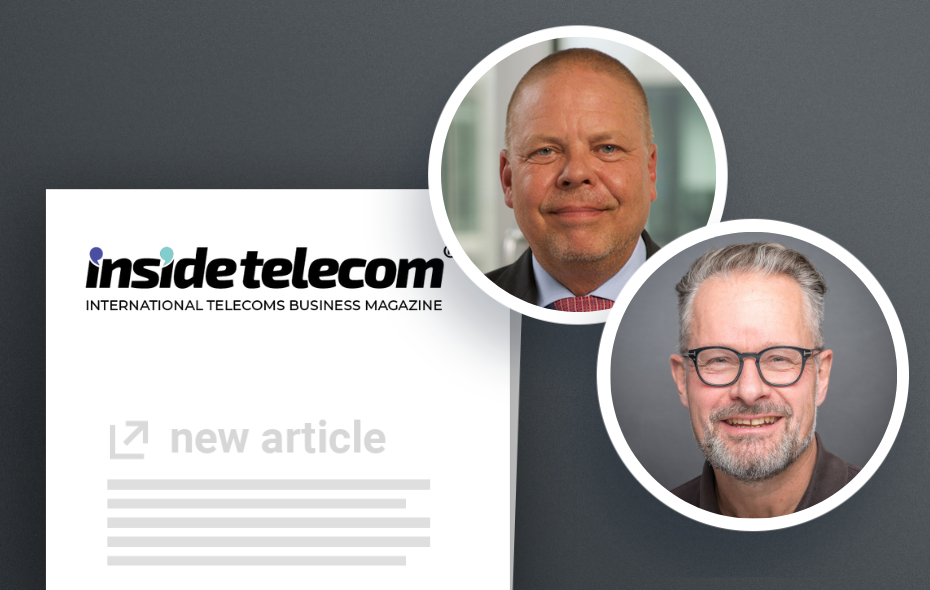Get in touch


A saturated market containing highly similar offerings from different providers doesn’t make it easy right now for telecommunications providers to set themselves apart from their rivals through their services and gain a competitive edge. It is clear, however, that even if they used to be pioneers in digitalization and networking, providing connectivity alone is no longer enough today. Telco providers need to demonstrate the necessary flexibility – and the courage – to think beyond classic telco services, try out new business models, and discard them again when needed if they want to remain a step ahead.
In its "Predicts 2022: Reshaping CSP Technology and Operations Strategies," market research and advisory firm Gartner also says that the success of new products and business activities will require adjustments in the operating model:
But what do forward thinking and trying things out look like in practice – particularly alongside existing, successful structures? Here are several examples that illustrate the current potential and opportunities in the telecommunications market.
The roll-out of the 5G network is opening up a diverse range of opportunities for CSPs in both the retail and business customer sectors. Particularly in this context, it is important for telcos to stop seeing themselves as mere infrastructure providers, and start to identify and serve the needs of different industries in order to occupy an optimal position between technology providers and software service providers.
One example: IoT (Internet of Things) and M2M (machine-to-machine communication) continue to increase in importance in many industry sectors. Telcos can create true added value for industry and capture new business segments by creating an IoT platform: an environment where devices can be networked and connected.
This system by no means represents the end of all possibilities, however. Based on the data gathered on a platform like this, additional services can be offered; AI and machine learning also come into play here. They can be used to increase the efficiency of machines, identify faults, or implement predictive maintenance, for example.
The columnist and Internet expert Tim Cole says: “It is anticipated that 5G will produce a series of revolutionary new applications, including autonomous driving, industrial automation, virtual reality, ultra-high-resolution video streaming, and electronic health care services. 5G will offer the necessary scalable connectivity to expand the possible number of wireless devices with efficient transmission of even small quantities of data across extensive coverage areas and with greatly reduced latency – all of which are prerequisites for things such as remote operations, intelligent indus-trial applications, and vehicle-to-vehicle communication (V2V), to name just a few. In any case, ML and AI will be the keys for the successful implementation of these new services by CSPs over the next few years and decades.”
Of course, CSPs can’t develop all the products and services that might be relevant for their customers by themselves – especially not at the pace the market demands. They simply don’t have the required expertise, and even if they did, it would require absurdly high investments. Therefore, in this context, forward thinking means forming alliances and partnerships. By collaborating with providers of other services, industrial companies, or technology service providers, CSPs can offer attractive add-on services to their users, as well as develop new products and offerings much more quickly. Simple examples of this include the diversification of their service portfolios or add-on packages for music or video streaming, which many telco providers offer in their contracts.
Co-creation goes even further: Under this approach, CSPs partner up with industrial or technology companies to develop new, innovative solutions to meet current user needs. The market research and consulting firm Gartner expects that co-creation will continue to increase in importance for large CSPs in particular (Hype Cycle for Communications Service Provider Operations, 2020).
A study by Omdia and Adobe (Customer Journey Optimization: The Key to Relevant Engagement, February 2020), with 300 companies from the media, entertainment, and communication sectors, also recommends that companies expand their partner ecosystems, while further conceding that scalability and flexibility are key success factors in such strategic partnerships.
When it comes to getting new products and services to the market faster, whether they are developed in-house or by external partners, technological integration with existing systems also plays a role. This means that CSPs that want to get fit for the future need an infrastructure that gives them flexibility, scalability, and speed; can handle large amounts of data; and enables integration of a variety of third-party systems.
Principles such as microservice architecture (division of the core functions into modules), separation of concerns (the clear isolation of functional properties), and open source and open standards have proven useful here. TM Forum also calls this solution an open digital architecture: It creates the foundation for standardized, cloud-native software components.
Capturing new business segments, trying out innovations, and launching new alliances: All of this requires a business design that enables the necessary speed and flexibility.
As such, a composable business model is suitable for CSPs: In this context, “composable” does not only refer to the technological infrastructure; it implies that the entire enterprise architecture has a modular, flexible structure. This kind of architecture guarantees scalability, fewer dependencies, faster decision-making, greater resilience, and finally, lower costs.
Whatever the future has in store: With this kind of structure, telcos will definitely be ready to respond to new challenges.
This article first appeared on inside Telecom. We appreciate your feedback and sharing the article.